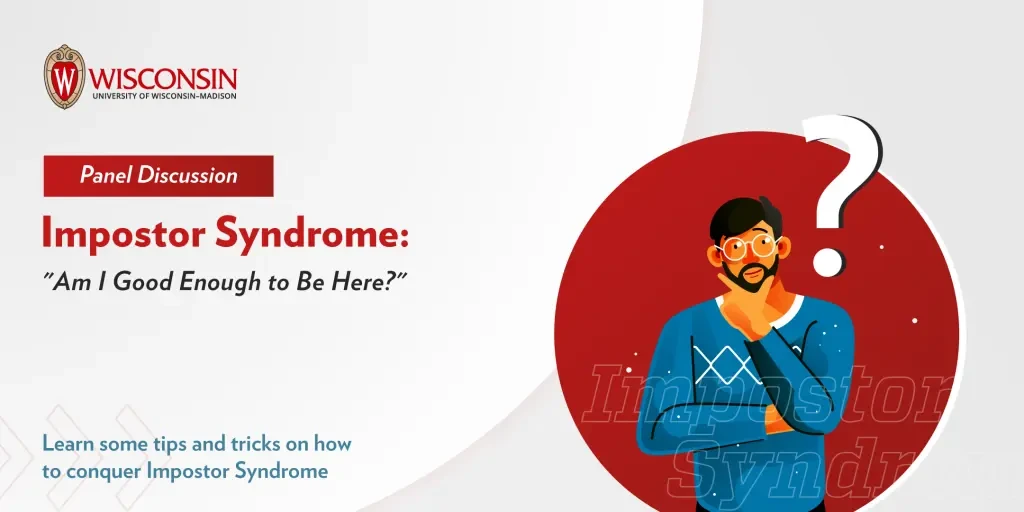Impostor Syndrome and Its Implications for Mental Health
Have you ever felt like you don’t really belong where you are? That you didn’t really earn your achievements and instead you got to where you are through dumb luck? Then you may have experienced impostor syndrome.
While in the past decade or so we have somewhat normalized the credo “fake it till you make it,” many young professionals, especially among minorities, often experience negative feelings and anxiety around a fundamental fear of being exposed as frauds—specifically for not measuring up to their job position or academic standing.
We recently hosted a virtual event during which expert panelists discussed this phenomenon in depth, sharing personal stories as well as tips & tricks to overcome the occasional bout of impostor syndrome. If you’d like to view this exclusive event, you can access it here: “Am I Good Enough to Be Here?”

What Is Impostor Syndrome?
Impostor Syndrome is a very specific form of self-doubt that normally afflicts high-achievers or people who grew up in families that placed a big emphasis on achievement. Though it is not a recognized condition in the DSM, psychologists have been aware of what we now know as “Impostor Syndrome” since the 1970s.
Why Is It So Common?
While there is no specific evidence pointing to a higher rate of impostor syndrome among any specific demographic, Millennials certainly are poised to be most vulnerable to its effects. Once known as “Generation Stress,” most millennials were raised by parents who alternated between over-praise and criticism. According to the American Psychological Association, this behavior can increase the risk of fraudulent feelings in young adults.
Social media and reality shows have become a catalyst for comparing our achievements with those we idolize, resulting in additional social pressures. Beauty filters and retouching software create unattainable standards for what our bodies should look like, while celebrities and influencers render lavish, extravagant lifestyles the norm.
These fabricated standards set up Millennials and Gen Z to establish unrealistically high goals for their personal and professional lives based on standards that don’t translate into the real world.
And then there’s the myth of the college drop-out billionaire. While many of us have perfectly adequate careers, it’s hard to take your achievements seriously when our society defines “success” as having founded a unicorn startup in your early 20s. No salaried position can possibly measure up to that, leaving us with the empty feeling that our achievements—as impressive and noteworthy as they might be—are not deserving of celebration and recognition.
Mental Health Implications
Impostor syndrome is sometimes tied to a high degree of social anxiety, but normally non-anxious people can also experience stress and apprehension when they find themselves in situations where they feel inadequate.
Impostor syndrome is likely to create a vicious cycle: lack of self-confidence leads to an inability to take credit for your own achievements; which in turn leads to beliefs of being a fraud and feelings of anxiety or shame; and that leads to overworking and feeling undeserving of praise or recognition—and the cycle starts again.
It’s easy to see how, if gone untreated, this dynamic can worsen anxiety and may lead to full-blown depression.

How Can You Recognize Impostor Syndrome?
People whose mental health suffers because of Impostor Syndrome are unlikely to reach out for help because of their fear of being exposed—but there are very specific signs that someone around you might be experiencing it.
Perfectionism is one of the most common expressions. Impostors feel the need to prove that they can carry out tasks flawlessly, but because of the additional pressure they put on their performance, they often end up either overthinking and overpreparing, or chronically procrastinating and avoiding assignments because of their unachievable high standards.
What Can You Do About It?
If you think you are affected by impostor syndrome, please take a deep breath, unclench, and know that you are not alone. This is a very common and manageable concern, with roughly 70% of people experience it at least once in their lifetime.
Whether you decide to seek help from a mental health professional, a family member, or a colleague, the most beneficial first step is to share your feelings and avoid becoming isolated. Vice versa, if you think someone close to you might be experiencing impostor syndrome, you can help them develop a more realistic perspective on their abilities and competence, and again try to not let them become isolated.
The goal is for the “impostor” to internalize their experiences of success. Simple steps that can help range from keeping a record of positive feedback from others to recalling past successes and making a point of celebrating current achievements.

May is National Mental Health Month, dedicated to raising awareness of those living with mental health issues and to help end the stigma so many experience. If you or someone you know are struggling with mental health, you can contact the Substance Abuse and Mental Health Services Administration (SAMHSA) National Helpline at 1-800-662-4357. The service is confidential, free, and open 24-hours a day, 365 days a year.



